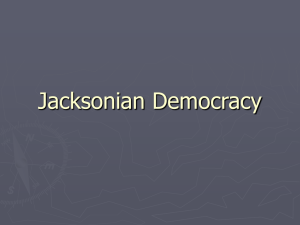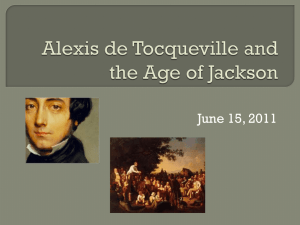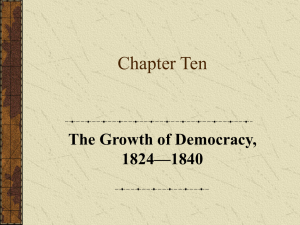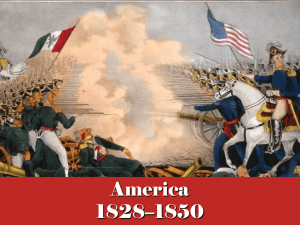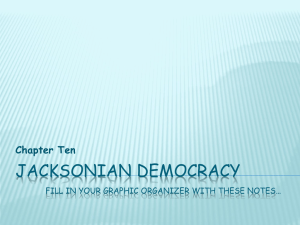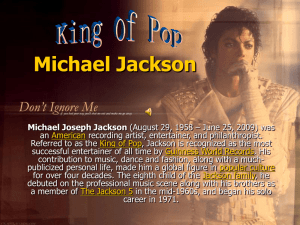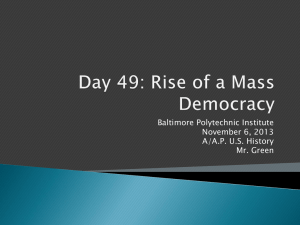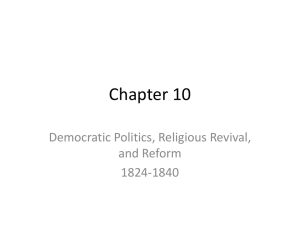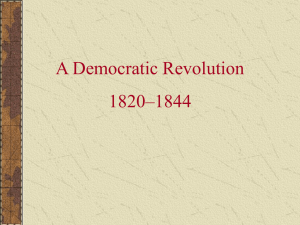Chapter 10 The Jacksonian Era - Mr. Greene`s History Classes
advertisement
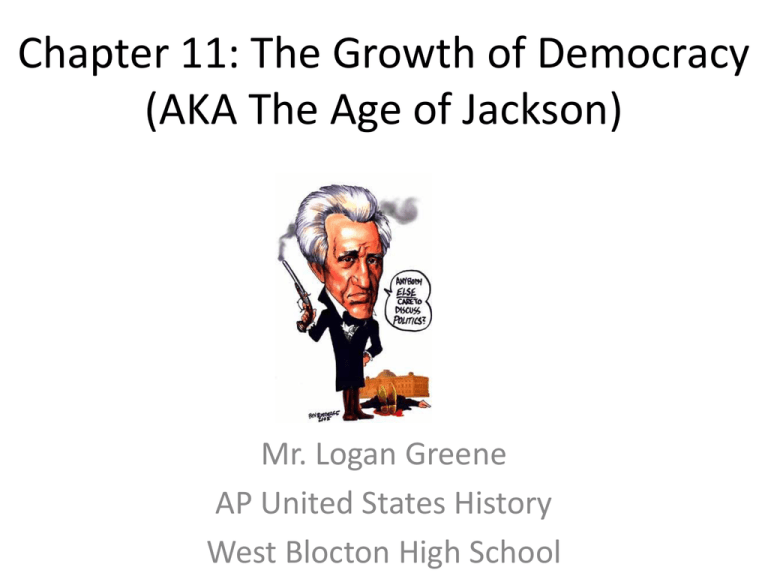
Chapter 11: The Growth of Democracy (AKA The Age of Jackson) Mr. Logan Greene AP United States History West Blocton High School Chapter Objectives • What made Andrew Jackson so popular among ordinary Americans? • How were free black people and women disenfranchised in the 1820’s and 1830’s? • What social, political, and economic events led to the creation of the Whig party? • How did the Whigs come to dominate American politics? • What did the Whigs achieve while in power? Egalitarianism (that means equality) • In 1816 Congress voted itself a pay raise • Unsurprisingly the public boiled with outrage • In the next election over 70% of incumbents are voted out • The public was growing disillusioned with the idea of elite white males deciding their fate Egalitarianism • In the 1820’s the idea of property ownership being a requirement to vote began dying out • The idea of all white men being equal became the paramount ideal behind politics • However, this led to Women and Free Blacks being disenfranchised • Laws were passed disallowing women and blacks the right to vote on the idea that women were to weak and emotional and blacks to unintelligent and lazy Second Great Awakening • The Second Great Awakening was a religious revival that swept the country in the 1820’s and 1830’s • It was led by the Methodist and Baptist faiths and pushed for evangelical beliefs of emotion and a personal attachment to God • Began to break down some bounds against slavery and women as it quietly preached equality Jacksonianism • Jacksonians built upon the issues with authority seen in the secular and religious revivals • Jackson’s defeat in 1824 with the controversial “Corrupt Bargain” actually bolstered Jackson’s popularity with the people • Jackson, from his humble beginnings in the West and his storied military past, seemed like the perfect new leader John Quincy Adam’s Presidency • Due to the controversy and suspicion surrounding the election Adams starts with a difficult position • His Presidency never gets off the ground despite his nationalist vision of internal improvements • By 1828 Adams was looked upon with disdain The Election of 1828 • Bolstered by the new style of politics and emotion and with help from Martin Van Buren running a nationwide campaign Jackson won easily Jackson in Office • Jackson’s election brought the common man happiness and elation as thousands showed up to his inauguration • Jackson began the “spoils system” in which party officials and supporters are rewarded with government jobs • Jackson immediately began taking apart Henry Clay’s “National System” of Banks, Tariffs, and Internal Improvements that tied the country together into one market Indian Removal • Jackson’s darkest legacy is his treatment of Native Americans • Jackson made no secret of his disdain for Indians • The five civilized tribes of the Southeast (Creek, Choctaw, Chickasaw, Cherokee, and Seminole) controlled millions of acres and pressure to remove them had been building • Georgia tried to forcibly take Cherokee land in 1825 so the Cherokee sued them • Despite Chief Justice John Marshall supporting them Jackson ordered the Indian Removal Act • This led to forced marches like the Trail of Tears and by 1835 virtually all Eastern Natives had been moved West to reservations The Nullification Crisis • Although Jackson was a States’ Rights advocate the Nullification Crisis proved one should not challenge his authority • In South Carolina the low country planters challenged the power of the federal government concerning protective tariffs and their damaging effects on the Southern economy • Nullification was the idea that state could nullify a federal law if it did not agree The Nullification Crisis • South Carolina so disagreed with the Tariffs of 1828 and 1832 that, led by John C. Calhoun, they voted to nullify them and refused to enforce them • Jackson, angered by the actions of his former VP, passed the Force Act which stated the Federal Government could militarily enforce its policies in the states • Jackson’s threat worked but he compromised by lowering the tariff rates as well The Bank War • Jackson despised the National Bank and the idea of the economy being so centralized • On July 10, 1832 Jackson vetoed the rechartering of the Bank of the US • This bold move actually improved Jackson’s standing for the election in November and he won re-election • Jackson’s policy was dangerous for the economy and it eventually broke down in 1837…..when his sucessor Martin Van Buren was in office The Panic of 1837 • Martin Van Buren was Jackson’s hand picked successor and rose to the Presidency with the election of 1836 • Jackson’s destruction of the Bank of the US led to the Panic of 1837 and the economic collapse of the US as Cotton prices fell • Van Buren had no answer to the issue Independent Treasury • The opponents of the Jacksonian Democrats came together to attack the party due to the Panic of 1837 • Known as the Whigs they blamed the entire incident on Jackson’s destruction of the Bank of the US and favored a strong national government • The Specie Circular by Jackson in 1836 had stated that only Gold and Silver could be used for public land purchases combined with the Independent Treasury System this took the Government out of the economy entirely Slavery • By the 1830’s outside of the south the nation was turning against slavery as a whole • Newspapers like The Liberator pushed for abolition (ending of slavery) • The South converged together and attacked the abolitionists with Gag Rules (laws that silenced abolitionists) • Van Buren’s quiet condoning of this portrayed him and the Democratic party as the party of the South The Whigs • The Whigs inaugurated the Second Party System of competition between them and the Democrats • The Whigs were essentially antidemocrats who pushed for stronger national government and economic strength • The Whigs rode military hero William Henry Harrison to the Presidency in 1840 with John Tyler as his VP The Whigs in Power • Harrison vowed to work with the Party while in office • Sadly for him he died soon after assuming office • John Tyler, unlike Harrison, refused to work with Whig leaders and seemed to attach more to Jackson’s views vetoing a new bank • Clay desperately tried to pass his American System reforms but to no avail against Tyler’s vetoes The Election of 1844 • In 1844 the election pitted the Democrat James K. Polk versus the Whig Henry Clay (again…) • Polk’s campaign focusing on annexing Oregon and Texas fired up the nation and he won a close victory • Before the end of his term Tyler was able to broker the annexation of Texas as a last stab at the Whigs who had disowned him Chapter Objectives • What made Andrew Jackson so popular among ordinary Americans? • How were free black people and women disenfranchised in the 1820’s and 1830’s? • What social, political, and economic events led to the creation of the Whig party? • How did the Whigs come to dominate American politics? • What did the Whigs achieve while in power?
